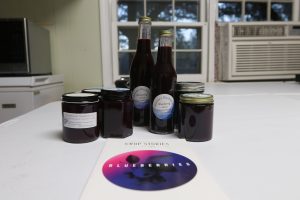
A group of products created by Chris and Rhonda Luther, owners of Rhonda's Blueberries, sit on a table in their home in Union Point, Georgia on Tuesday, March 2, 2021. Included in the picture are jars of jam, jelly, and juice as well as a cookbook created by the Luthers that includes their farming story and more than a dozen blueberry recipes. These are all items they have sold at the Athens Farmers Market. (Photo/Abigail Vanderpoel)
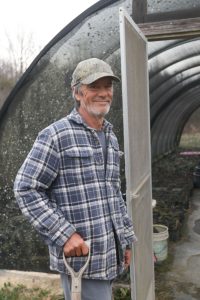
Chris Luther poses for a portrait outside of his greenhouse on his farm in Union Point, Georgia on Tuesday, March 2, 2021. Chris and Rhonda Luther are the owners of Rhonda's Blueberries in Union Point, Georgia. In his greenhouse, Chris has grown thousands of blueberry bush cuttings. The cuttings start out growing in his greenhouse until they're big enough to be moved to pots. Once they've been potted, Chris brings them to sell at the Athens Farmers Market each week. (Photo/Abigail Vanderpoel)
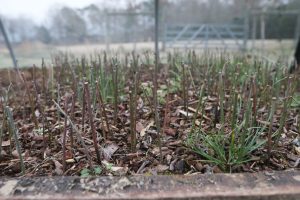
Blueberry bush cuttings sit inside Chris Luther's greenhouse on Tuesday, March 2, 2021 in Union Point, Georgia. These early cuttings will spend time growing in the greenhouse before being transferred to pots and sold at the Athens Farmers Market by Chris and Rhonda Luther, owners of Rhonda's Blueberries in Union Point, Georgia. (Photo/Abigail Vanderpoel)
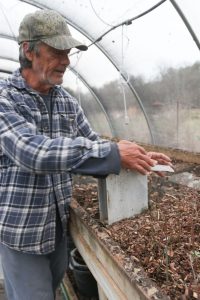
Chris Luther demonstrates how his pressurized watering system works in his greenhouse in Union Point, Georgia, on Tuesday, March 2, 2021. Chris designed the water system in his greenhouse himself to ensure that his blueberry bush cuttings can survive to be big enough to transfer to pots and then sell at the Athens Farmers Market. (Photo/Abigail Vanderpoel)
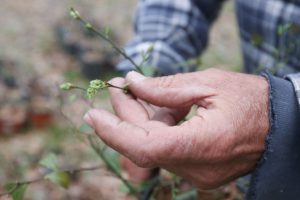
Chris Luther gently holds the bud of one of his potted blueberry bush cuttings in Union Point, Georgia on Tuesday, March 2, 2021. Chris and his wife Rhonda own a small blueberry farm named Rhonda's Blueberries in Union Point, Georgia. They sell a variety of products at the Athens Farmers Market every week, including potted cuttings of their blueberry bushes so that others can plant their own fruit-bearing bushes. (Photo/Abigail Vanderpoel)
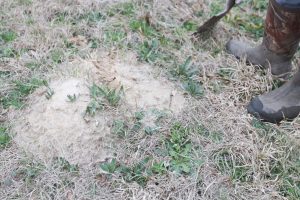
An ant hill sits in a blueberry field owned by Chris and Rhonda Luther in Union Point, Georgia on Tuesday, March 2, 2021. Chris and Rhonda own the business Rhonda's Blueberries. Because Chris chooses not to use insecticides of any kind, he allows ant hills to crop up in his blueberry fields. The ants eat the larvae of other bugs that would damage his blueberry crops. (Photo/Abigail Vanderpoel)

The sun sets over the irrigation pond at Chris and Rhonda Luther's farm in Union Point, Georgia, on Tuesday, March 2, 2021. Chris and Rhonda are the owners of Rhonda's Bluerries. Chris uses the pond on their property to provide water to his irrigation system in the blueberry fields. (Photo/Abigail Vanderpoel)
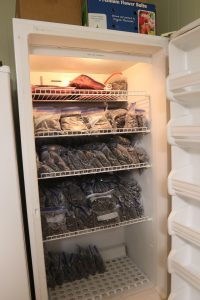
A freezer sits full of bags of frozen blueberries at Chris and Rhonda Luther's farm in Union Point, Georgia, on Tuesday, March 2, 2021. Chris and Rhonda are the owners of Rhonda's Blueberries. During picking season, about half of the blueberries picked on the farm are frozen so they can be used and sold during the off season. (Photo/Abigail Vanderpoel)
When Chris and Rhonda Luther planted their first blueberry bush in 2007, neither of them had ever grown blueberries before. Now they have more than 1,200 thriving blueberry bushes of eight different varieties in Union Point, Georgia. These bushes provide blueberries for them to make jam, jelly, and juice and still have enough to freeze and sell fresh at the Athens Farmers Market every Saturday.
They’ve faced no small amount of challenges in the 14 years they’ve been running Rhonda’s Blueberries. Through the years, they’ve been resourceful and resilient through their learning curve, economic recessions, and now COVID-19.
However, there is a threat to small farms and blueberry farms in particular that is far bigger than one couple or one farm can combat on their own, according to Pam Knox: climate change.
Effects of Climate Change
Climate change is not a new topic, but it remains a complicated one. Pam Knox is a researcher at the University of Georgia looking at the effects of climate change on agriculture in Northeast Georgia. It’s not widely known that the effects of climate change vary greatly by geographic region. This means that farmers like Chris and Rhonda will experience different challenges than farmers in southern Georgia.
Pam Knox explained that there are two main problems with the increasing temperature of weather in the northeast.
“One is that we’re not having enough chill hours for the peaches and blueberries, but we’re also seeing more frequent occurrences of warming up quickly, plants bloom, and then we have another cold event come in and frost and it kills off a lot of the production,” she said.
The way farmers like Chris and Rhonda look at climate change is very different from that of climate researchers. Climate researchers look at the past, present, and future in terms of hundreds of years while farmers focus on the next day, week, or month.They simply don’t have time to look at datasets about climate research, such as this one put out by NASA, because they have plants that require constant care.
“I’m busy. I’m out in the field working rather than watching the TV,” Chris explained, when asked about how much news coverage he watches regarding climate change.
Problem Solving
Chris is the only farmer caring for the plants at Rhonda’s Blueberries with Rhonda taking care of management and various other tasks. When problems arise, whether due to climate change or not, he has to adjust and bring creative solutions to the table, especially since all of his blueberries are certified organically grown with no herbicides or pesticides.
Because Chris does not use pesticides, he allows ant hills to crop up in his fields without trying to control them. While this might seem counterintuitive, the ants feed on the larvae of other insects that pose more severe threats to the blueberry plants. This method has worked for him for over a decade as he has not had a single year with significant crop loss due to insects.
There have been many discoveries for Chris throughout his years of growing blueberries, especially since he started with no experience. One of these that he’s proudest of is his ability to turn cuttings from his bushes into potted plants that he can sell at the market to others, so they can take them home and plant their own bushes in their yards. After killing “literally thousands” of cuttings, he’s perfected a technique he was once told was impossible.
The cuttings start in his greenhouse where he has designed a unique pressure-controlled watering system. Once the cuttings are large enough, he moves them into pots where they either stay in the greenhouse or go outside. He then brings them to the Athens Farmers Market where he sells them and provides advice for his customers on how to plant and grow their own bushes.
Everything that Chris has built on his farm, he has poured hours of planning and labor into. For every problem that has come up, he has come up with a solution that he tests himself and perfects until it works. This is how he has always run his business and how he plans to continue running it as it has brought him great success. This is also his approach in regards to climate change.
Moving Forward
Blueberries are one of the most vulnerable crops to weather in Northeast Georgia; they have to have enough hours of cold weather in the winter to produce good blooms in the warm weather. After they’ve bloomed, however, they are extremely vulnerable to cold-weather events and frosts. When warmer weather begins earlier in the spring, the possibility of late frosts becomes an issue. Pam Knox explained that the last frost date can be well into April and that these frosts have the potential to kill most of or all of a crop’s production.
In the beginning years, Chris said he used to spend the entire night before a frost happened out in the field with his bushes.
It’s always windy the day before a frost,” he explained. “Always. Up to 40 mph winds.”
He would set fires all around the field and wait until the very last moment to cover the bushes in frost cloth so as not to crush the blooms. However, in recent years, he has stopped all of these efforts. His plants have now become so big that frosts only cause damage to the outer layers of the plants; the inner layers of the plant remain unaffected, and it only affects ripe blueberries, not ones that are still green and ripening.
Because of this, he still gets enough of a harvest that it’s not worth risking damaging the blooms with frost cloth. Chris also said that the frosts have not been consistently occurring later in the growing season in his observation. He has followed the same protocols for dealing with frosts for the last several years. Because his methods are continuing to work, he plans to continue the same protocol in coming years.
He applies this same philosophy moving forward in future years in regards to climate change; he’s going to stick with what works for him on his farm to continue growing his crops. When he encounters problems, he works to find a solution. He expressed that while he does believe that global temperatures are rising, he believes that it’s from natural causes.
“I don’t think we’re the cause of it, in my opinion,” he said, referring to the human impact on climate change.
He isn’t making any plans to change or adapt anything in preparation for predicted climate changes.
Chris has already previously come up with a solution for days of increased temperature during the summer. If the weather gets up to between 90-100 degrees Fahrenheit for a week or longer, it causes damage and dries up the blueberries. When this happened once several years ago, Chris and Rhonda pulled the berries off of the bushes and set them out to purposely dry them in the sun and sold them at the market as sun-dried blueberries. This paired well with their other products, seeing as how they already set aside about half of their production in a freezer to sell frozen or to turn into juice, jam, and jelly to sell during the winter. Dried blueberries just added one more product to their list.
There is no debate in the scientific community that global temperatures are rising and that human activity is a contributor to the rising temperatures, John Knox said in an interview. John Knox is another climate researcher and professor at UGA focusing on the broader dynamics of weather and climate.
However, farmers like Chris and Rhonda aren’t necessarily feeling severe impacts in this region yet. There are several potential reasons for this.
Pam Knox explained that the northeast region of Georgia is located in a “warming hole,” meaning that this region hasn’t warmed up as much as other areas of the country or even the state. This region is also located far enough from the coast that hurricanes don’t tend to reach the area.
One particular difference between the northern and southern regions of Georgia is that the mountains in the north provide some shelter from winter storms and winds. This could explain why Chris doesn’t see winter frosts occurring more frequently.
Abigail Vanderpoel is a senior majoring in journalism at the Grady College of Journalism and Mass Communication with a minor in biology and certificates in new media and interdisciplinary writing.


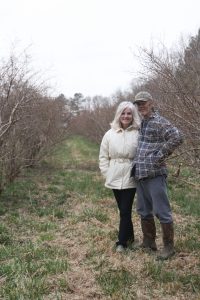
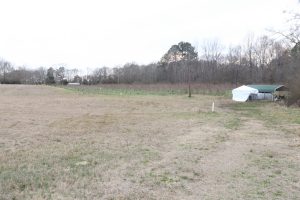
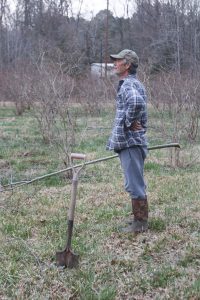
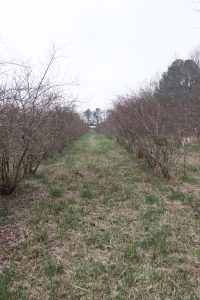
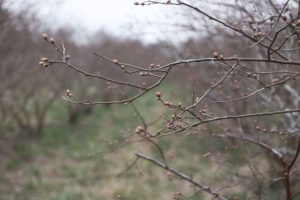
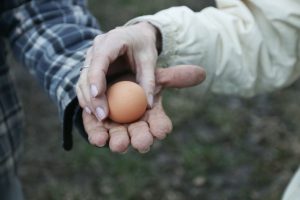
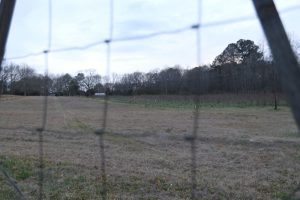








Show Comments (1)
ShunCy
Climate change is causing global temperatures to rise, but Northeast Georgians are not feeling the effects. The farmers in this region seem to be used to rocky terrain and hardy weather conditions that allow their crops–including soybeans, peanuts, corn for grain production-to grow year after year with no major losses due climate changes or pests on a large scale. Farmers across Georgia produce $3 billion worth of agricultural products each year from over 2.2 million acres of farmland while also supplying close proximity markets like Atlanta with locally grown foodstuffs as well as create jobs through farm machinery sales and other services related businesses around it’s booming farming industry statewide.